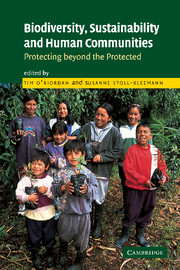Book contents
- Frontmatter
- Contents
- List of figures
- List of tables
- List of contributors
- Preface
- Part I Setting the scene
- Part II Policy and management
- 2 Biodiversity: threats and challenges
- 3 Biodiversity and biodepletion: the need for a paradigm shift
- 4 People, livelihoods and collective action in biodiversity management
- 5 Deliberative democracy and participatory biodiversity
- Part III Case studies
- Part IV Perspective
- Epilogue
- Index
3 - Biodiversity and biodepletion: the need for a paradigm shift
Published online by Cambridge University Press: 22 September 2009
- Frontmatter
- Contents
- List of figures
- List of tables
- List of contributors
- Preface
- Part I Setting the scene
- Part II Policy and management
- 2 Biodiversity: threats and challenges
- 3 Biodiversity and biodepletion: the need for a paradigm shift
- 4 People, livelihoods and collective action in biodiversity management
- 5 Deliberative democracy and participatory biodiversity
- Part III Case studies
- Part IV Perspective
- Epilogue
- Index
Summary
Introduction and background
We are witnessing the start of a mass extinction of species that will, if allowed to run its course, leave a deeply depauperised biosphere for at least 5 million years – a period twenty times longer than humans have been humans (Myers and Knoll 2001). The phenomenon must rank as one of the most defining episodes in humanity's history. No other human-induced event has imposed a planet-wide impact for more than a few centuries at most. Yet we understand all too little about this phenomenon. We do not know, except in the roughest terms, how many species share the planet with us and how many we are eliminating each year. Will people in the year 2100, and people far further into the future, not look back with astonishment that we were so little concerned with an episode that could turn out to be the most exceptional of its kind since the dinosaurs' demise 65 million years ago?
Moreover the repercussions of what we do – or don't do – in the next couple of decades will affect people for the next several million years, i.e., the period that evolution will need to come up with replacement species.
- Type
- Chapter
- Information
- Biodiversity, Sustainability and Human CommunitiesProtecting beyond the Protected, pp. 46 - 60Publisher: Cambridge University PressPrint publication year: 2002
- 6
- Cited by



